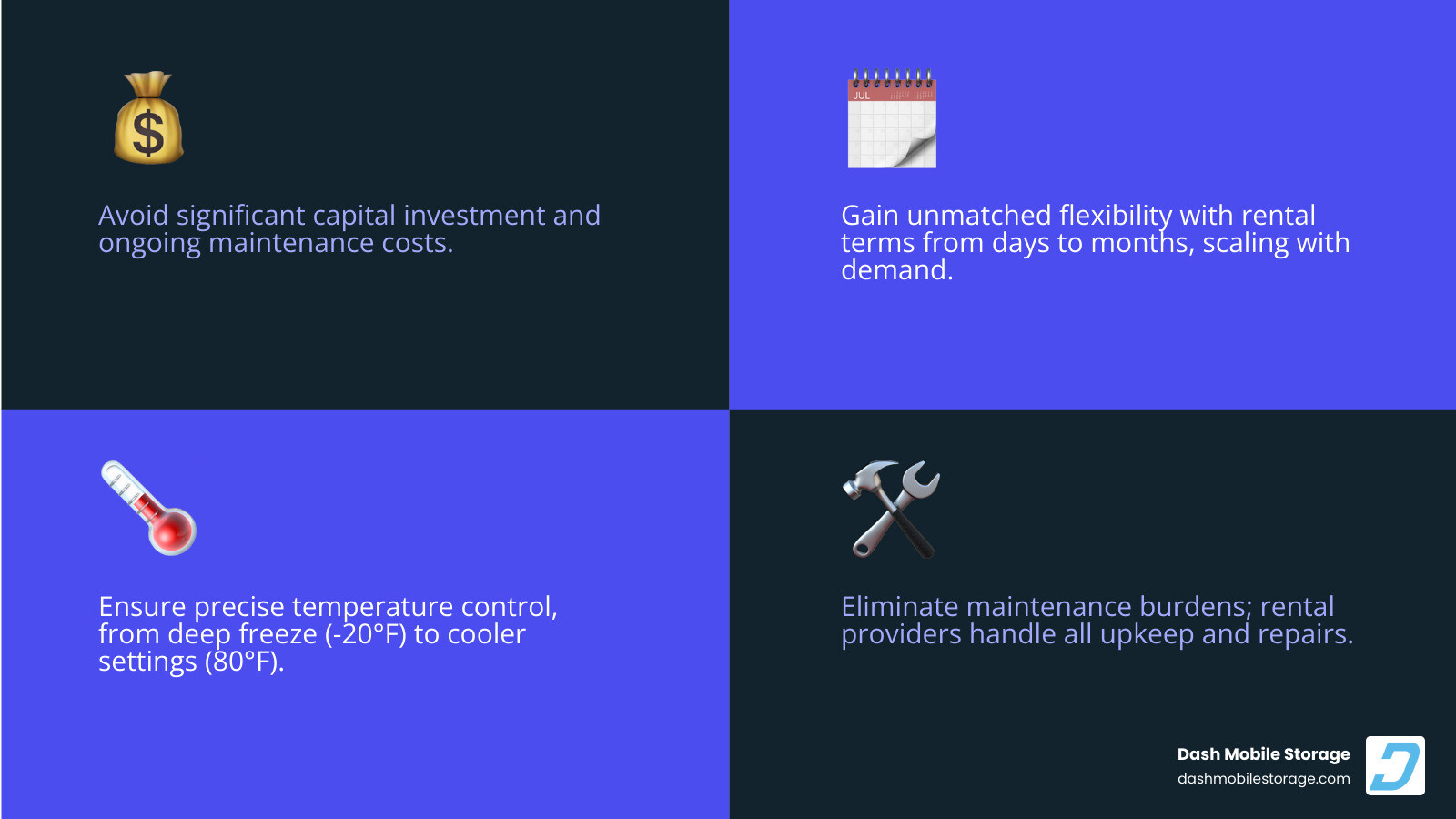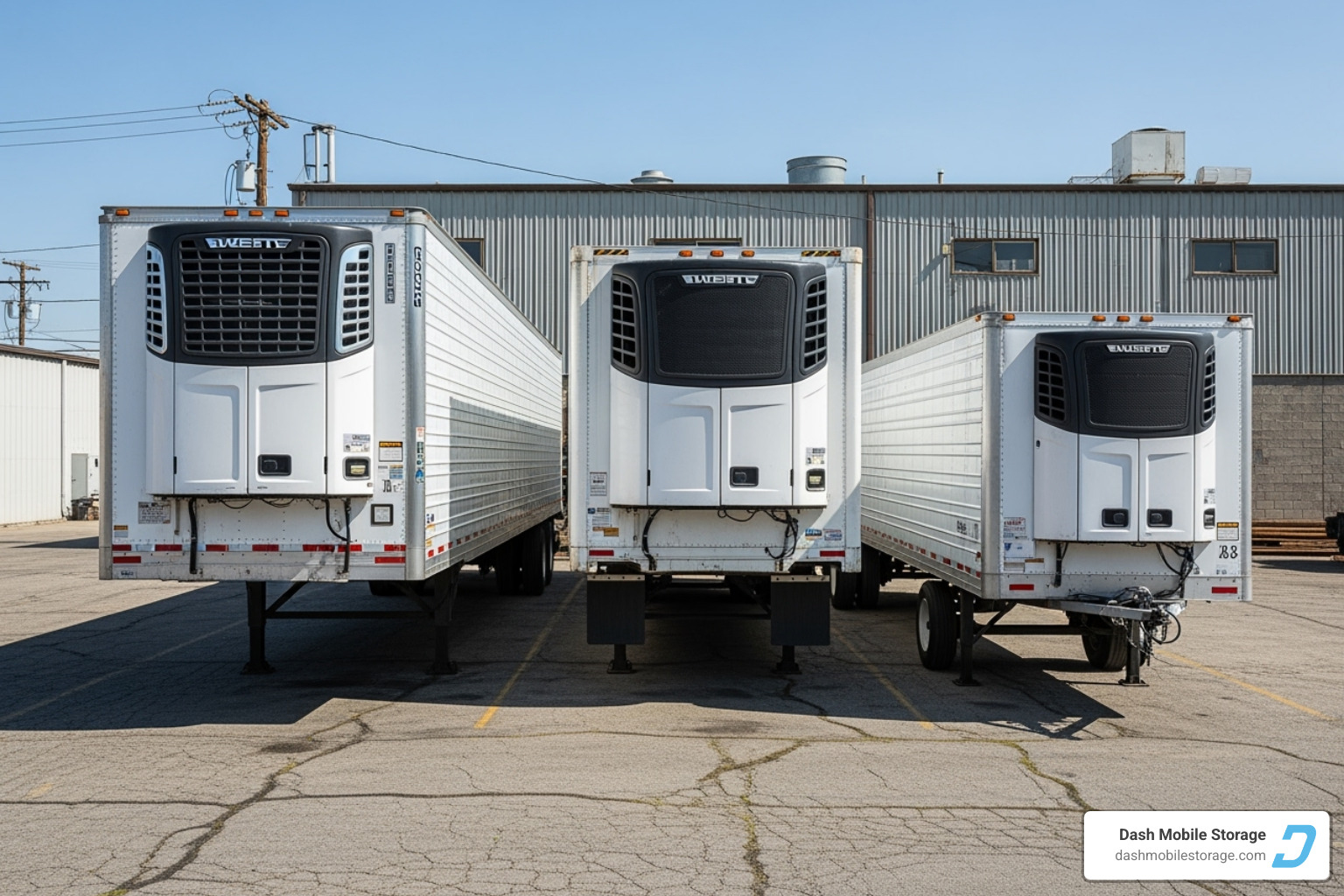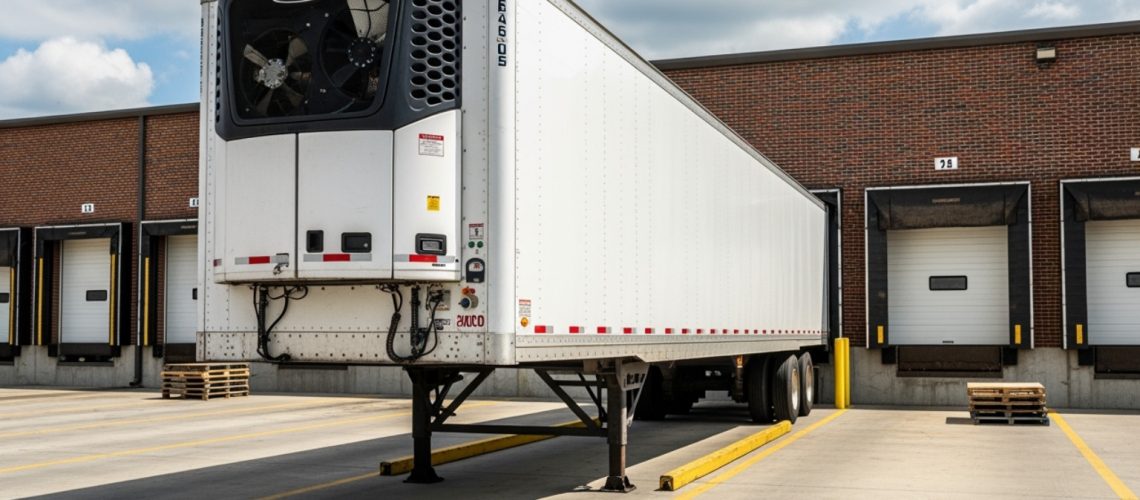Why Refrigerated Trailer Rental Matters for Your Business
Refrigerated trailer rental offers flexible, cost-effective cold storage without the major capital investment of buying equipment. For transporting perishable goods, expanding storage during peak seasons, or protecting materials on job sites, renting provides immediate access to reliable refrigeration.
Why businesses rent refrigerated trailers:
- Flexibility: Rent for days, weeks, or months.
- Cost Savings: Avoid $50,000+ purchase prices and maintenance costs.
- Temperature Control: Maintain precise conditions from -20°F to 80°F.
- Quick Deployment: Get units delivered and running within 24-48 hours.
- Scalability: Easily add or reduce capacity as demand changes.
- No Maintenance: Rental companies handle all repairs and upkeep.
These mobile solutions are vital for cold chain logistics. They are used by food distributors, construction managers, event caterers, pharmaceutical companies, and grocery stores for everything from bridging production gaps to managing seasonal surges. As one industry source notes, “We will deliver what you need and where you need it.”
The rental market includes small 8-foot towable units for local events and large 53-foot semi-trailers for commercial distribution. Options include standard refrigeration (above freezing), freezer capabilities (down to -20°F), and even dual-temperature zones in a single trailer. For instance, construction managers in South Florida use rentals to manage inventory and protect materials from heat damage.

Refrigerated trailer rental terms made easy:
- cooler trailer
- mobile refrigerated trailer
What to Look for in a Top Refrigerated Trailer Rental Company
Choosing the right refrigerated trailer rental partner is about finding a company that understands your needs and provides effortless service. We recommend prioritizing reliability above all else, as your perishable goods require consistent temperature control.
The best rental companies offer 24/7 customer support because emergencies don’t follow a 9-to-5 schedule. Clear maintenance and repair policies are also crucial. A top-tier provider handles major repairs proactively, while renters typically manage basic care. Rental term flexibility is another must-have, allowing you to rent for a few days or several months. You can learn more info about our services to see how flexible terms can support your needs.
Key Service Offerings
A great rental company provides valuable extras. Look for providers who offer comprehensive on-site setup, including positioning, stabilizing, and securing the trailer. Timely delivery and pickup are essential for saving time and money.
Quality companies also provide adequate power cable provision and help you understand your electrical needs (e.g., a dedicated 120-volt outlet or a 20-amp circuit). If you lack the right power source, many offer generator rentals (typically 6500+ watts). Practical accessories like ramps and shelving improve safety and efficiency during loading and unloading. For specialized needs, Reefer Cargo Box Rentals can provide unique configurations.
Support and Maintenance
The best partners offer emergency service availability because perishables can’t wait. Before delivery, a trailer should undergo a thorough pre-rental inspection process, checking refrigeration systems, seals, and controls to ensure FSMA compliance.
During your rental, on-call technical support provides peace of mind. While you handle basic care, the rental company should solve any significant mechanical issues. Many providers also offer user training on operation during delivery to prevent small issues from becoming big problems. For businesses in our service area, our team at Refrigerated Storage Company in Palm City provides responsive support to keep your cold chain intact.
Finally, understand insurance requirements, driver’s license needs (a CDL may be required for larger units), and business registration upfront to avoid surprises. Some units also feature GPS tracking for added security.
Understanding Your Refrigerated Trailer Options
Choosing the right refrigerated trailer rental means finding the perfect fit for your specific needs. The ideal trailer for a weekend event differs from one needed for cross-country pharmaceutical distribution.

Types of Trailers: Finding Your Fit
First, determine how cold you need it. Refrigerated trailers maintain temperatures above 32°F for items like produce and dairy. Freezer trailers go down to -20°F or lower, essential for frozen foods and certain medical supplies. Some units offer dual-temperature zones, allowing you to transport frozen and refrigerated goods in the same trailer.
Size is another key factor. Small towable trailers (8-16 feet) are perfect for local events or extra restaurant storage and can be pulled by a standard pickup. Large semi-trailers (28-53 feet) are built for commercial distribution and high-volume cargo. A third option, ground-level containers (20 or 40 feet), sit on the ground for easy walk-in access, making them popular for construction sites and temporary warehouse expansions. Many run on electric power, eliminating the need for diesel.
Our Cold Storage Container Rentals Palm City page shows how ground-level access can simplify operations. For a full overview, see our Refrigerated Storage Containers and Trailers.
Key Technical Specifications to Consider
Once you’ve chosen a type and size, consider these technical details:
- Cooling Capacity (BTU): Ensures the unit can maintain temperature even in hot weather. A unit with 6,845 BTU/h can hold temps in 86°F heat.
- Insulation Quality: Thick, well-sealed walls (around 4 inches) keep the cold in, protecting products and saving energy.
- Flooring Type: Heavy-duty duct floors promote airflow, while textured, non-slip surfaces improve safety.
- Safety Features: Look for wide doors with emergency releases, secure locks, sturdy steps, stabilizing jacks, and good lighting.
- Dimensions and Payload: Ensure the trailer’s capacity (e.g., 2,700-7,000 lbs for towables) and internal cubic footage match your cargo needs.
For more details on features, visit our Refrigerated Storage Unit Rentals resource page.
Profiles of Ideal Rental Providers
Not all refrigerated trailer rental providers are the same. Some excel at large-scale logistics, while others focus on local service. Understanding the three main provider types helps you find the right partner.

The Full-Service Logistics Partner
These are the heavy lifters of the rental world, with massive fleets for large-scale commercial transport. They offer standardized contracts and corporate accounts, and they are experts in FSMA compliance for food transport. Their large semi-trailers (up to 53 feet) typically require a CDL driver and are built for serious logistics.
The Local & Regional Specialist
These providers offer intimate knowledge of your market and flexible service. Their local expertise translates into faster delivery times and more responsive support. They are ideal for small businesses and events, such as a local restaurant needing extra space or an event organizer running a festival. They build relationships within the community. For insights, see our services for Refrigerated Trailer Rentals on the Treasure Coast.
At Dash Mobile Storage, we embody this model across South Florida and the Treasure Coast, serving areas like Palm City, Miami, and Fort Lauderdale. We understand that your deadlines are non-negotiable. Learn more about our local expertise at Reefer Trailer Rentals in Jupiter or our Refrigerated Trailer Rentals in Palm City page.
The Container & Customization Expert
These specialists offer versatile, often stationary cold storage solutions. They focus on ground-level entry units, which simplify access. At Dash Mobile Storage, this is a signature feature. Many of these units are electric-powered, making them quiet, eco-friendly, and efficient for placement at docks or indoors.
They excel at long-term stationary storage with flexible lease options and can provide custom modifications like specific shelving or lighting. For more on these specialized solutions, visit our Reefer Container Rentals in Palm City page.
Navigating the Refrigerated Trailer Rental Process
Getting a refrigerated trailer rental is a straightforward process. We’ve broken it down into three simple steps to get your cold storage solution up and running.

Step 1: Assessing Your Needs & Getting a Quote
First, plan what you need to accomplish. We work with food service companies, pharmaceutical distributors, caterers, florists, and construction sites. If you’re in Brevard County and need reliable cold storage, we can help.
Next, figure out the right size by considering your cargo volume and weight. A small 5-foot trailer might hold 100 boxes of wine, while a 12-foot unit can fit a restaurant’s inventory. We can help you calculate the capacity you need. Also, decide on your rental duration, whether it’s for a weekend, a month, or longer-term.
Once you have these details, requesting a quote is easy. We’ll provide an estimate based on trailer type, size, rental period, and extras. Find local options on our Refrigerated Trailer Rental Near Me page.
Step 2: Understanding Costs and Requirements for your refrigerated trailer rental
Several factors influence your refrigerated trailer rental price. Larger trailers, specialized freezer units, and dual-temperature zones cost more. Rental duration also plays a key role; weekly and monthly rates offer better daily value. For example, a 12-foot trailer’s daily rate might be $195-$220, but a monthly rental could average $115-$120 per day. Your location and additional services like delivery and generator rentals also affect the total.
Here’s a general snapshot of what you might expect to pay:
| Trailer Size | Average Daily Rate | Average Weekly Rate | Average Monthly Rate |
|---|---|---|---|
| Small (5-8 ft) | $130 – $185 | $715 – $1,010 | $2,505 – $3,320 |
| Medium (12 ft) | $195 – $220 | $1,070 – $1,190 | $3,560 – $3,750 |
| Large (16-24 ft) | $255 – $285 | $1,250 – $1,400 | $3,325 – $3,650 |
Note: These are ballpark figures. Our Stuart-area refrigerated storage rentals have pricing specific to that market.
To rent, you’ll typically need a standard driver’s license for smaller towable units, but a Commercial Driver’s License (CDL) is required for large semi-trailers. Most companies, including us, require proof of insurance and business registration.
Step 3: Delivery, Setup, and Pickup for your refrigerated trailer rental
Before delivery, prepare your site by choosing a level, accessible location clear of obstacles. Power source verification is critical. Smaller units usually need a dedicated 120-volt, 20-amp outlet, while larger containers may require 480V 3-phase power. We’ll walk you through the requirements when you schedule.
On delivery day, our team positions the unit, stabilizes it with leveling jacks, and secures it. We then provide a quick on-site tutorial on operating the controls. When your rental period ends, simply call us to schedule a convenient pickup. We handle the removal, leaving your site clear. For local service details, see Reefer Trailer Palm City. At Dash Mobile Storage, we pride ourselves on timely delivery and pickup that works around your schedule.
Frequently Asked Questions about Refrigerated Trailer Rental
Here are answers to some of the most common questions we hear about refrigerated trailer rental.
How cold can a refrigerated trailer get?
The temperature range depends on the unit type.
- Refrigerator units typically maintain temperatures between 32°F and 40°F, ideal for fresh produce, dairy, and beverages.
- Freezer units can reach -20°F or lower, necessary for frozen foods, ice cream, and certain medical supplies.
The typical temperature range for versatile units is -20°F to 80°F, allowing for precise control. Modern cooling systems and thick insulation (around 4 inches) ensure this temperature is held steady, which is critical for pharmaceuticals, flowers, and food safety. Always tell your rental provider your product-specific requirements so they can match you with the right unit.
What are the power requirements for a reefer trailer?
Power needs vary based on use.
- On the move: Large reefer semi-trailers use self-contained diesel power to run the refrigeration unit during transport.
- Stationary use: Units are plugged into electric power (“shoreline power”), which is quieter and more economical.
Common voltages for smaller towable units include a dedicated 120-volt, 20A outlet. Larger containers and semi-trailers often need 480V 3-phase power, though transformers can sometimes adapt them for 240V 3-phase. If your site lacks hookups, a generator is necessary. A 6500-watt generator is typically the minimum for smaller trailers.
What are the main benefits of renting versus buying a refrigerated trailer?
Renting a refrigerated trailer offers significant advantages for most businesses.
- Cost-Effectiveness: Avoid the large upfront investment of $50,000+ for a new trailer, plus ongoing depreciation, registration, and insurance costs.
- No Maintenance Costs: The rental company handles all major repairs and servicing, saving you from unexpected expenses and downtime.
- Flexibility for Seasonal Demand: Easily scale your storage capacity up or down to match business cycles, ensuring you only pay for what you need.
- Access to Modern Equipment: Use reliable, well-maintained units with the latest refrigeration technology without the commitment of ownership.
- Scalability: Quickly adapt your logistics by renting one small unit or multiple large ones as your needs change.
For businesses in South Florida, renting a Refrigerated Storage Unit Rental provides the agility to stay focused on your core operations.
Conclusion
This guide has equipped you to make a smart refrigerated trailer rental decision for your business. You now understand the different trailer types, key features, and what to look for in a provider.
The primary benefit of renting is flexibility. You can scale your cold storage capacity to meet demand without the large capital investment and maintenance burdens of ownership. It’s an agile solution for caterers, restaurants, construction managers, and distributors who need reliable temperature control.
For businesses throughout the Treasure Coast and South Florida—from Palm City to Miami—Dash Mobile Storage delivers reliable and timely mobile cold storage. We understand the challenges of our climate and the demanding schedules of local businesses. Our secure, ground-entry storage options are designed for convenience, with flexible lease terms to fit your needs. We provide efficient service for excess inventory, job-site storage, or dock-level solutions, working around your deadlines.
Ready to find the perfect cold storage solution? Explore our reefer container options and see how we can help you keep your cool.

